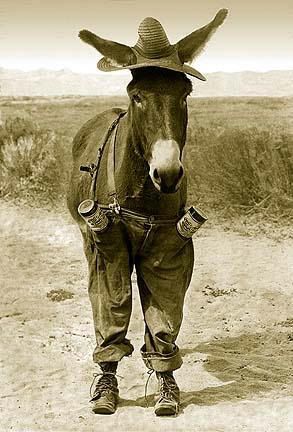Post by olhillbilly on Apr 20, 2005 23:52:57 GMT -6
Euclid Makes Saving Wood a Slam-dunk
By “Michel” Fromage d’Amour
When the Cold War ended, Russian expatriates Boris Intayorli and Freesia Balzof thought they would be out on the street. Instead, they became what they had always been taught to hate; capitalists. Banding together, they created Euclid Saw Company, and introduced a technological leap to the band saw market. Their Kerfless Band Saw Blade, which cuts wood with absolutely no kerf, has taken the woodworking world by storm.
“We first introduced the Kerfless Band Saw Blade at the 2005 AWFS woodworking and tool show, and sales just took off from there,” explained Balzof. “Everyone loves it.”
“There are a wealth of advantages to this blade,” added Boris. “For one thing, it is so thin, it takes almost no power to run it. That means even a half horsepower band saw can cut through the thickest wood easily. The fact that it leaves no kerf means you save on wood, get ultra clean cuts without tooth marks, and there’s no sawdust produced.”
Balzof admitted that there are some shortcomings, but insisted that users would get used to them quickly. “At first, people found it very hard to set up the blade for correct tracking, because it is so thin it is virtually invisible.” To deal with the problem, they started painting the blades bright yellow, to make them easier to see, but Intayorli confessed that the paint wears off with use. “You just have to be a bit more careful, and assume the blade is there, even if you can’t see it.”
The idea for the kerfless blade grew out of Soviet technology developed during the Cold War. The Russian army created an invisible razor wire to flummox defectors along the Berlin Wall. They kept it secret from the rest of the world until recently. “Once the Berlin Wall came down, there really was no good use for the stuff,” said Balzof “so we were able to buy the tooling to make it cheaply. We simply adapted it for band saw blades. Fortunately, there was no patent protection on it, since the army preferred to keep it a secret.”
What’s next for this intrepid pair?
“For now, we want to focus on getting these blades out to the American market,” said Balzof. “We’ll worry about developing other products later.”
By “Michel” Fromage d’Amour
When the Cold War ended, Russian expatriates Boris Intayorli and Freesia Balzof thought they would be out on the street. Instead, they became what they had always been taught to hate; capitalists. Banding together, they created Euclid Saw Company, and introduced a technological leap to the band saw market. Their Kerfless Band Saw Blade, which cuts wood with absolutely no kerf, has taken the woodworking world by storm.
“We first introduced the Kerfless Band Saw Blade at the 2005 AWFS woodworking and tool show, and sales just took off from there,” explained Balzof. “Everyone loves it.”
“There are a wealth of advantages to this blade,” added Boris. “For one thing, it is so thin, it takes almost no power to run it. That means even a half horsepower band saw can cut through the thickest wood easily. The fact that it leaves no kerf means you save on wood, get ultra clean cuts without tooth marks, and there’s no sawdust produced.”
Balzof admitted that there are some shortcomings, but insisted that users would get used to them quickly. “At first, people found it very hard to set up the blade for correct tracking, because it is so thin it is virtually invisible.” To deal with the problem, they started painting the blades bright yellow, to make them easier to see, but Intayorli confessed that the paint wears off with use. “You just have to be a bit more careful, and assume the blade is there, even if you can’t see it.”
The idea for the kerfless blade grew out of Soviet technology developed during the Cold War. The Russian army created an invisible razor wire to flummox defectors along the Berlin Wall. They kept it secret from the rest of the world until recently. “Once the Berlin Wall came down, there really was no good use for the stuff,” said Balzof “so we were able to buy the tooling to make it cheaply. We simply adapted it for band saw blades. Fortunately, there was no patent protection on it, since the army preferred to keep it a secret.”
What’s next for this intrepid pair?
“For now, we want to focus on getting these blades out to the American market,” said Balzof. “We’ll worry about developing other products later.”






